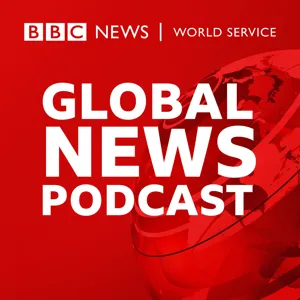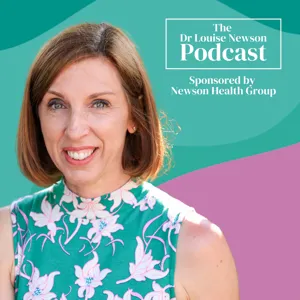Podcast Summary
Exploring the World with the BBC: The BBC offers high-quality journalism and storytelling that provides a broader perspective and engages us with thought-provoking content on various topics from around the world.
The BBC is a valuable source of information and inspiration, offering stories that make us think and connect us beyond borders. While we can only experience the world firsthand to a certain extent, the BBC provides us with a broader perspective through their high-quality journalism and storytelling. They don't aim to tell us what to think but instead offer thought-provoking content that engages and entertains. From stories about scientific discoveries and innovations to global news and cultural insights, the BBC is a trusted and essential resource for anyone looking to expand their knowledge and understanding of the world. So whether you're interested in menopause in animals, innovative vocal patches, or the mysteries of bird migration, the BBC is the place to go for the latest and most compelling stories. Get your daily dose of information, inspiration, and engagement on the new bbc.com.
UCLA researchers develop voice restoration patch: UCLA researchers create a patch that converts throat vibrations into speech, offering a more natural and hands-free solution for individuals with vocal impairments.
Researchers at UCLA have developed a new voice restoration technology in the form of a patch that converts throat vibrations into audible speech, providing an alternative to traditional handheld voice devices for those with vocal impairments. This patch, which sticks directly to the skin on the throat, uses soft, stretchy material to detect muscle movements and convert them into electrical signals, ultimately producing clear speech. This innovation represents a significant improvement over earlier voice devices, offering more natural and hands-free speech restoration for individuals with voice disorders. This groundbreaking research, published in the journal Nature Communications, opens up new possibilities for those who have undergone surgeries like vocal cord removal, allowing them to communicate more effectively and regain a sense of normalcy. This development is not only significant for individuals with vocal impairments but also for the medical community, as it offers a more convenient and less intrusive solution for voice restoration.
Voice Decoding Patch with 95% Accuracy, Menopause Linked to Longer Lifespan: Researchers created a voice decoding patch with high accuracy and discovered menopause may extend lifespan in certain species
Researchers have developed a voice decoding patch with an accuracy rate of approximately 95%, which could potentially revolutionize communication technology. This patch uses machine learning algorithms to correlate electrical signals with specific words, learning and improving over time. However, the team needs to conduct more tests to expand the vocabulary and translation accuracy before it can be commercially available, which they hope will happen within the next 3 to 5 years. Meanwhile, in a different study, researchers discovered that menopause, a phenomenon unique to humans and some whale species, is linked to longevity. The study, published in the journal Nature, compared five species of toothed whales that undergo menopause to those that don't and found that females experiencing menopause lived an average of 40 years longer than other species' females and longer than their own species' males. Researchers believe this may be due to reproductive competition, as the best way for animals to propagate their genes is to reproduce throughout their entire life, and menopause may provide an evolutionary advantage by allowing females to focus their resources on raising their existing offspring instead of continuously producing new ones.
Discoveries in Whale and Bird Behavior: Studying whale and bird behavior led to insights on menopause in whales and identifying crucial bird rest stops during migration, benefiting conservation efforts.
Menopause in whales may have evolved to reduce competition between older and younger females for resources, allowing for intergenerational help. This discovery, based on observing behavior in toothed whales, could potentially provide insights into why menopause developed in humans as well. In the realm of ornithology, another study revealed the importance of identifying bird rest stops during migration. By using weather radar, researchers have discovered key resting areas along the eastern US, which could aid in protecting migrating bird populations and preserving their habitats. This information is crucial as bird populations in North America have seen a significant decline in recent decades, with an estimated loss of nearly 3 billion birds in the last 50 years.
Tracking Bird Migrations with Weather Radar Data: Researchers use radar data to study nocturnal bird migrations in deciduous forests, often on private land, and plan to collaborate with landowners for conservation.
Researchers are using weather radar data to track and map the migratory patterns of birds, particularly those that are nocturnal and rest in deciduous forest fragments. These areas often lie outside of protected areas, with a third identified in spring and fall hot spots being privately owned. Researcher Feng Yi aims to use this data to collaborate with private landowners on conservation efforts. Additionally, Mint Mobile offers premium wireless plans starting at $15 a month, and Easycater simplifies corporate catering needs with online ordering, budgeting tools, and payment by invoice.
Exploring the Role of Technology in Ordering and Consuming Food: Technology simplifies food ordering through platforms like EzCater, offers convenience with food delivery apps, and helps restaurants adapt with tools like online ordering and contactless payment options.
Technology is revolutionizing the way we order and consume food. During our discussion, we explored how platforms like EzCater are using technology to simplify the catering ordering process for businesses. They offer a wide selection of restaurants, make it easy to compare prices and menus, and even provide features like real-time ordering status and delivery tracking. Moreover, we touched on the topic of food delivery apps and how they're transforming the way we get meals. With apps like Grubhub, DoorDash, and Uber Eats, we can now order food from our favorite restaurants and have it delivered right to our doorstep in a matter of minutes. This convenience is especially valuable during the pandemic when many people are staying home to stay safe. Furthermore, we discussed the impact of technology on the restaurant industry itself. With the help of tools like online ordering systems, contactless payment options, and digital menus, restaurants are able to adapt to the changing landscape and continue serving customers safely. In summary, technology is making it easier and more convenient than ever before to order and receive food. Whether it's for a business catering order or a personal delivery, technology is streamlining the process and providing new opportunities for both consumers and businesses. To learn more about how technology is transforming the food industry, visit ezcater.com.






